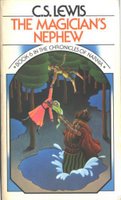We follow the adventures of Digory and Polly, as they stumble into other worlds, and through their adventures we learn about the creation of Narnia and the origin of the White Witch. I grew up reading the Narnia books with my family, and we always read them in chronological order-- that is to say, in the history-of-Narnia order, not the order that Lewis wrote the books. So, when we read through all the chronicles, we always started with The Magician's Nephew. It may not be my favorite of the Narnia books, but there is plenty that is fascinating here-- one dying world, another being born; a creation story, and a garden that seems somewhat familiar, complete with a tree bearing the silver apples of life.
There is plenty here that is fascinating, and worth thinking about or discussing with others. This time through, I thought more about Lewis' treatment of magic (it is bad, and its practitioners-- namely, Uncle Andrew and Queen Jadis-- are evil, to varying degrees); this was on my mind, in part, because of the outcry against Harry Potter from certain quarters, while the same people have no problem with magical fantasy from Tolkien or Lewis. It bothers me that they never articulate what the problem is, or the difference between the books which are acceptable or not.
It is also fun to be reminded that Lewis believed in the possibility of other worlds-- it is something that comes up in the Narnia books and his space trilogy, but I think he mentions the possibility in his non-fiction writings, as well. In most of the Narnia books, it is easy to think that there is only Narnia and Earth, but here Digory and Polly get to Narnia by way of pools in the quiet wood between the worlds-- and there are hundreds of pools, which suggests there are far more worlds than we ever get to explore or read about.
The creation imagery is particularly wonderful. It seems especially appropriate and wonderful that Aslan creates Narnia with a song-- and, for a while, different parts of that creation (most notably the stars) participate in the music of creation. This creative power is so strong that anything will grow in the new soil of Narnia-- a lamp post, from a broken off part of a lamp; gold and silver trees from the coins in Uncle Andrews' pockets; and even a toffee tree, from the children's candy.
But along with the creation of Narnia, there is a kind of story that mirrors the Fall. Even before Narnia is created, evil is brought into this new world in the form of Queen Jadis from the dead world Charn, which she helped to destroy. And Jadis was awakened by the willfulness of a little boy, by a simple choice. To make up for this mistake, and to protect Narnia, Aslan sends that boy, Digory, to fetch an apple from a tree in the center of a far-off garden (and there are echoes of Eden here); and in the garden, there is a temptation scene with the witch, Jadis. One of the things that intrigues me most about this part of the story is what Aslan's explanation of the fruit. It is in the nature of the fruit to give life and protection, but if it is not used properly-- if it is stolen, taken without permission or selfishly-- it does not bring joy. In particular, Aslan says that if someone had taken the apple to protect Narnia without being sent for it, it would indeed have protected Narnia, but it would have made Narnia a harsh, cruel land like the world of Charn. This is interesting, because even a good thing, that brings protection and life, when abused can be destructive or cause perversion.
The Magician's Nephew offers plenty to fascinate and entertain. Among other things, Lewis offers a warning-- the world of Charn, and the Deplorable Word that Jadis uses to destroy it, are offered as clear parallels to the path of humans on Earth. But at the same time that we receive this dire warning, we are also given the hope and delight of the new life in the joyous world of Narnia.
| Title: | The Magician's Nephew |
|---|---|
| Author: | C. S. Lewis |
| Date published: | 1955 |
| Genre: | Fantasy / Young Adult |
| Series: | Chronicles of Narnia |
| Number of pages: | 186 |
| Notes: | Repeat Reading. Read and discussed with community group. |



0 comments:
Post a Comment